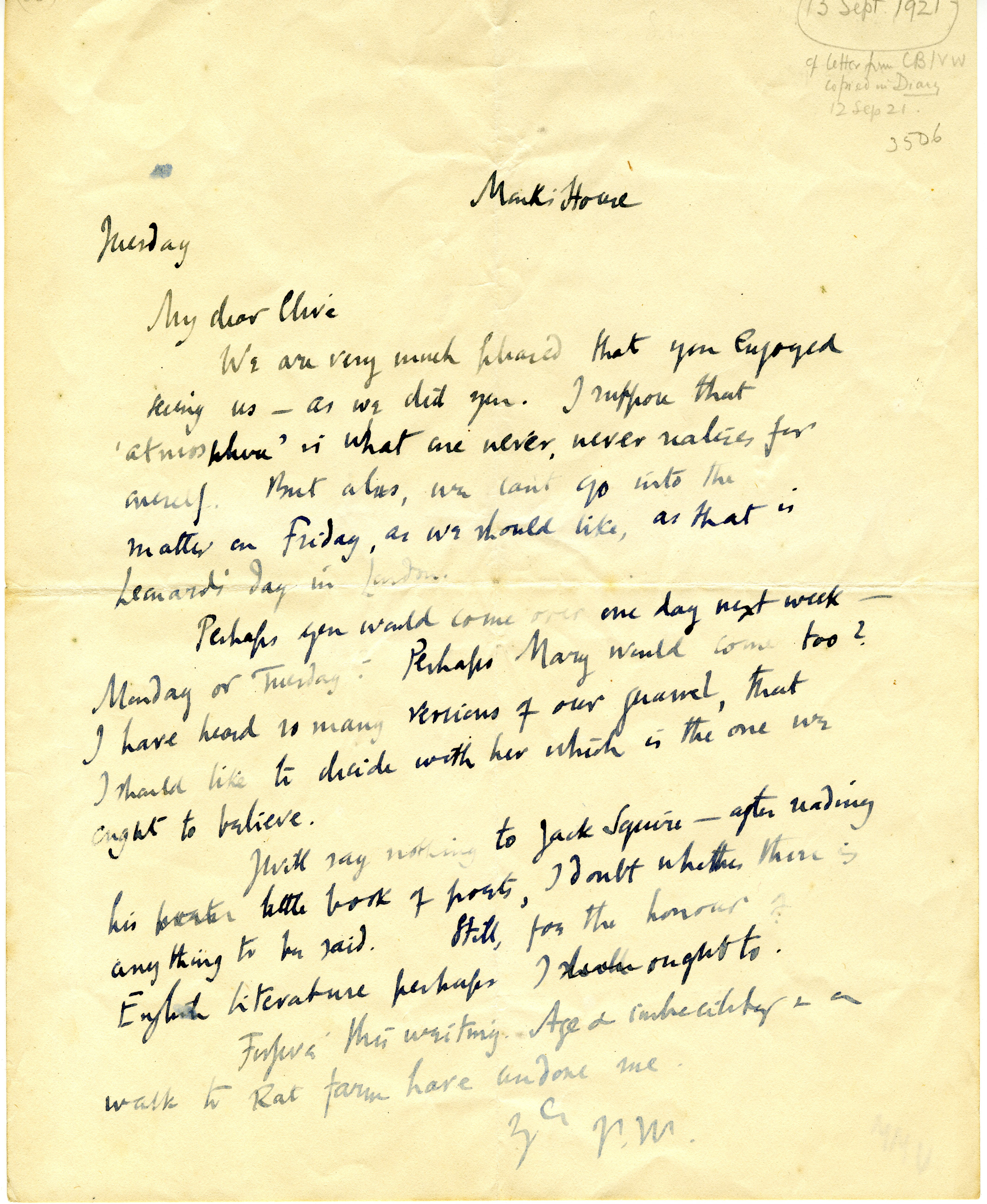
Virginia Woolf. Source.
Virginia Woolf is easily described as one of the greatest and most innovative writers of the English language. Woolf, born in England on January 25, 1882 was also a pioneer of feminist and experimental writing, being one of the first to ever write a novel in a stream-of-consciousness narrative voice. Her most famous works, such as Mrs. Dalloway, A Room of One’s Own, Orlando, and To the Lighthouse, are considered modern literary classics. A founding member of the Bloomsbury Group, Woolf, alongside her husband Leonard Woolf, her sister and brother-in-law Vanessa and Clive Bell, and many others who lived in the Bloomsbury area of London bucked the norms of early twentieth century Western culture for more libertine, experimental ways of living, loving, and producing art.
Here at Special Collections Research Center, we are fortunate to house some of Woolf’s work, including a few books and a handwritten letter by the author herself. Below are a selection of these records, which are always available for access in SCRC!

“A Haunted House” and “Freshwater” books from SCRC’s rare book collections.
A Haunted House and Other Short Stories

Vanessa Bell. Source.
This book of collected short stories by Woolf was published posthumously by her husband Leonard in 1944. Notably, six of the eighteen total stories were unpublished prior to Woolf’s passing, while the remaining twelve were published by a variety of magazines and a previous collection of hers. The cover art was created by Woolf’s sister, Vanessa, as were all of the first editions of her books. Though Woolf was undoubtedly the most famous of the Bloomsbury Group, Vanessa was a prominent and admired artist in her own right, creating culturally subversive paintings that have stood the test of time.
Freshwater: A Comedy
Did you know that Virginia Woolf wrote a play? Neither did we! And in fact, nor did most of the world until 1969. The only play Woolf ever wrote, Freshwater, was originally performed in Vanessa’s art studio in 1935, and hardly ever saw the light of day again. Generally considered to be silly and uneven – very different in tone from her other work – it was never a public success. As the plot revolves around people and artists in Woolf’s personal life, such as her great-aunt Julia Margaret Cameron, it would make sense that it was intended more as a private joke rather than a public endeavor. Freshwater wasn’t professionally staged until 2009, directed by Anne Bogart as a part of the Women’s Project and performed off Broadway at the Julia Miles Theater in New York City.
The Virginia Woolf Letter

The Virginia Woolf letter.
Donated by George Mason University Adjunct Professor Diana P. Decker in 2009, this letter is a single piece of correspondence from Woolf to her brother-in-law Clive Bell on September 12, 1921. Unfortunately, due to the nature of the letter being an isolated record, it is difficult to contextualize the contents of Woolf’s message to Bell. It is, however, interesting to note that twelve years prior to the writing of the letter, Woolf carried out an emotional affair with Bell after the birth of his and Vanessa’s first child. Though this kind of relationship would be considered extremely taboo in 1909 (as well as now) it wasn’t uncommon for members of the Bloomsbury Group to carry out unusual romantic relationships. The writer Dorothy Parker aptly described these practices in a memorable quote: “[They] lived in squares, painted in circles and loved in triangles.” Despite this, Vanessa Bell was notably unhappy about the relationship and it ended rather quickly.

Virginia Woolf and Clive Bell. Source.
Another notable biographical fact related to the Virginia Woolf letter – in 1922, less than a year after the letter was written, Woolf met the writer Vita Sackville-West, after which would commence perhaps Woolf’s most famous emotional and physical love affair. Sackville-West inspired the writing of Woolf’s landmark book Orlando, which was described as a direct love letter to her. Though the Virginia Woolf Letter doesn’t contain any groundbreaking information on her life, it does belong in a complex contextual background of the writer’s life at large.
Today, Virginia Woolf would be 136 years old. It’s a testament to her talent and unique world perspective that her work is still being read and taught with fervor. Happy Birthday, V!
The Virginia Woolf letter is available digitally on SCRC’s online digital repository.
Sources
http://virginiawoolfblog.com/virginia-woolfs-flirtation-with-clive-bell/
http://www.nytimes.com/2009/01/26/theater/reviews/26fres.html?mtrref=www.google.com
https://www.npr.org/templates/story/story.php?storyId=99810873
https://en.wikipedia.org/wiki/A_Haunted_House_and_Other_Short_Stories
Follow Special Collections Research Center on Social Media at our Facebook, Instagram, and Twitter accounts. To search the collections held at Special Collections Research Center, go to our website and browse the finding aids by subject or title. You may also e-mail us at speccoll@gmu.edu or call 703-993-2220 if you would like to schedule an appointment, request materials, or if you have questions. Appointments are not necessary to request and view collections.

